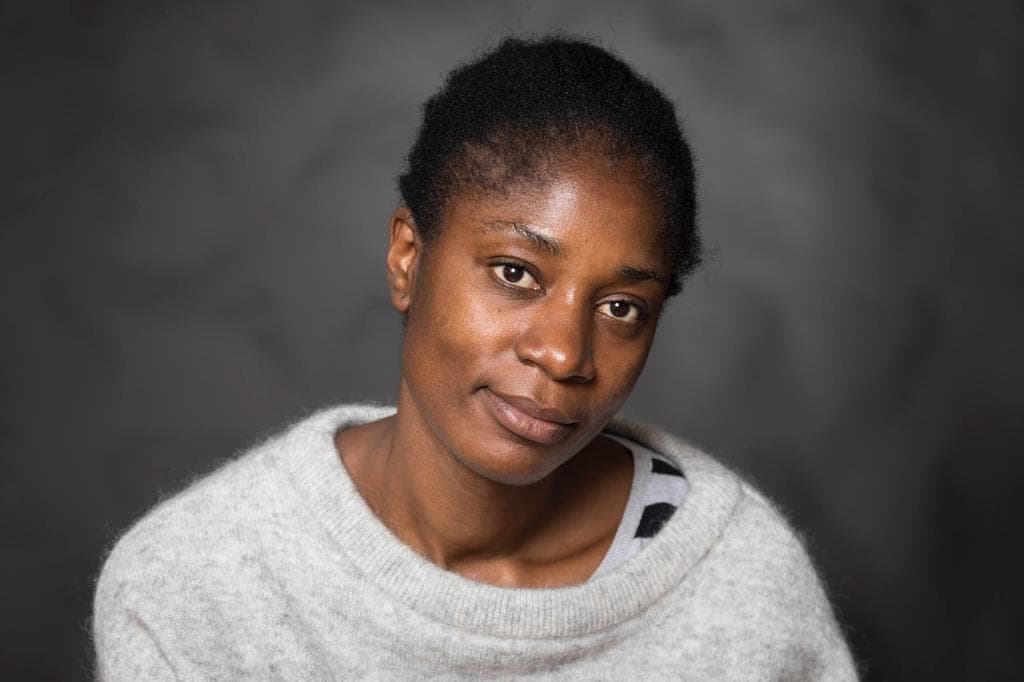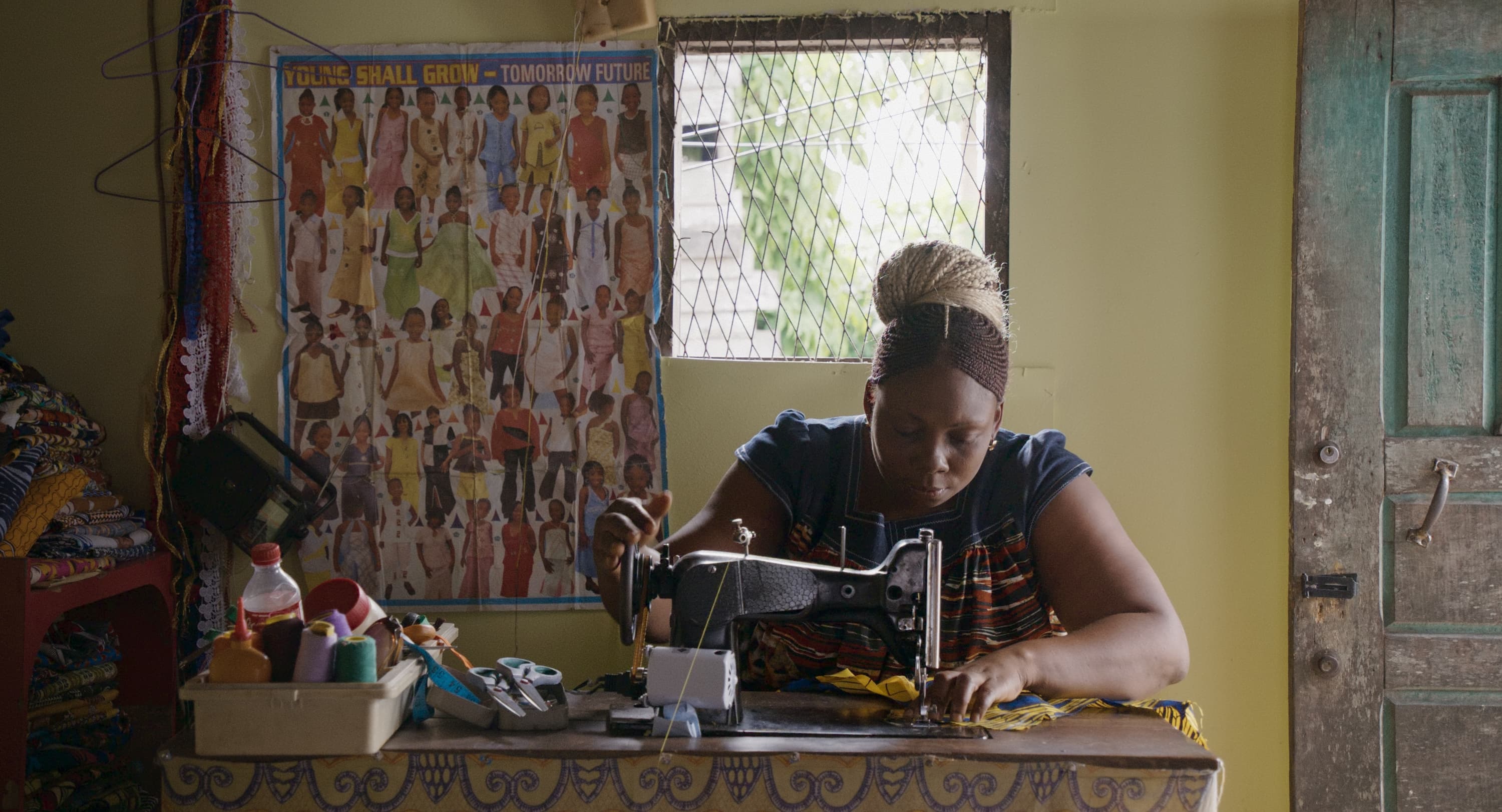
In conversation with Rosine Mbakam
Lecturer and researcher Melissa Thackway speaks to filmmaker Rosine Mbakam on the relationship between reality and realism for Notes on a festival.
Exploring the unique relationship of trust between documentary film and audiences, Focus Program: Fabrications tests the limits of the format’s promise of truth. Rosine Mbakam’s Mambar Pierette is one of the ten films in the selection, each probing the difference between reality and realism. Lecturer and researcher Melissa Thackway speaks to filmmaker Rosine Mbakam to explore the extent to which our realities inform our fictions, and vice versa.
Mambar Pierrette mixes the techniques of documentary and fiction. After directing three feature-length documentaries, what sparked your desire to make fiction?
Fiction was always my first desire. I discovered cinema through fiction. In Cameroon, I had no access to creative documentary. I saw reports on TV, but that wasn’t what I wanted to do. The fictions I had access to were European and American; they weren’t films that allowed me to question my reality. They distanced me from what I saw every day. I discovered creative documentary in Belgium when I came to film school. I also discovered the history of documentary and how it also contributed to constructing stereotypes about Africa. For me, documentary is a tool to deconstruct all the colonial ideology surrounding my identity, my history. I take up documentary as an arm to deconstruct, to show my own history, that of my cinema, and as a way of telling stories that reveals itself with the people I film. When I decided to make a fiction, documentary allowed me to explore—I’m still exploring; Mambar Pierrette is my first fiction—to tell myself that I could do things differently, to concretely come to the conclusion that the way in which people make fiction in Europe doesn’t at all correspond to how I want to. In drawing on my documentary experience, I sought to make a fiction rooting myself in the reality that I film.
– Rosine Mbakam“For me, documentary is a tool to deconstruct all the colonial ideology surrounding my identity, my history.”
What changed for you with the move to fiction? You have continued to draw strongly on documentary codes; in what way did they influence Mambar Pierrette, its subject, writing, choice of actors, mise-en-scène, editing?
One thing I take from documentary is that I don’t think in terms of actors, a word that’s related to fiction, because they are people, characters, who play their own lives. Documentary helped me realize that I also need to construct the imaginative realm of the characters I film in relation to what they are. These are people who thought their lives were trivial, uninteresting, and who never thought they could be film characters. They became actors during the filmmaking process, but in the beginning, when I was in Cameroon with Pierrette, it was just about my documentary relationships, how I relate to the other, like when I go film someone with my camera alone. It was the same because, even though I wrote the story, there were things in her life that I hadn’t imagined. This documentary relationship remained the same, but we are in a system that loves genre categories. My relationship with her when making the film wasn’t that of a director and an actor. These are people from my family. When I first wanted to make films, it was my family who inspired me. The stories that came to me were these people I saw, who I wanted to recount, their daily lives, their way of living and expressing themselves. My cinema is rooted in that.

Mambar Pierrette by Rosine Mbakam
Was the film very scripted—the dialogues, notably, which are extremely sober—or did you leave room for improvisation?
It was very scripted because I love writing! Yet at the same time, what is wonderful is that we share a very rich language which, as it is rooted in people’s lives, gave me a richer palette, and took me beyond what I had written. What is beautiful is when the documentary aspect takes over from the fiction, and that’s what I love about this confrontation in my way of directing—how the fiction confronts reality. As a director, I have the humility to observe how reality deploys all its plenitude, its force. Pierrette and the other members of my family allowed me to have confidence in my aesthetic choices because this process gave them confidence too; they realized we have things to recount, things to say that can be heard, that can touch not only our community, but people from elsewhere, whose stories make us dream too.
What did fiction offer you in terms of mise-en-scène, your precision work on the framing, the extremely choreographed aspect of the film, its rhythm?
Fiction allowed me to go beyond reality in the narration. The political aspect wasn’t visible in Pierrette’s life, but her life is the consequence of all these factors. Fiction allowed me to bring out what was difficult to see in Pierrette’s reality, without being artificial. If I had tried to force that, she would have said things that are not part of her daily life; I would have imposed them on her reality, whereas fiction allowed me to weave in the invisible, to bring it to the fore in the real. Fiction brought me a richness; it allowed me to complexify the story and to take it beyond Pierrette’s reality because it’s not just Pierrette’s; what she experiences is just an infinite consequence of political choices that go beyond her. I wanted to show that and to extend it to the political situation of a country.
– Rosine Mbakam“Fiction allowed me to weave in the invisible, to bring it to the fore in the real.”
The pioneering Senegalese filmmaker Safi Faye, whose film Kaddu Beykat (1975) is also in this focus program, said during a masterclass at the Creteil Festival de Films de Femme in 2010 that, after Mossane, she wasn’t convinced she was capable of making fiction because, and I cite her: “my imagination comes from what I have lived, the values that have been instilled in me,” adding, “I think it is very difficult for an African to put a boundary between fiction and documentary.” Would you agree?
She put it perfectly! To me, there is no boundary. It’s difficult because there is a history of cinema that belongs to the West, and we Africans learn cinema in the mould of that history, and I think that there is a style from Africa and the colonized nations—whether fiction or documentary—that has not yet totally manifested itself. What Faye said is very true; it is hard to dissociate, which is why, even if my stories are fictional, when I imagine them, I see people, not actors. I see them in their daily lives doing this, saying that. Even if they are imaginary, everything is related to a very strong reality that exists, that’s true. Cinema remains an industry that sometimes reinforces these boundaries, and I’m happy that they are being deconstructed and questioned because you can’t confine cinema to categories. Cinema is more than that, like humans, we who tell these film stories. My characters are more than what I attempt to capture, and it is this “more than” that I am looking for.
Discover the Focus Program: Fabrications
View the selected films in the Focus Program: Fabrications here.
This article was published in IDFA 2023 Notes on a festival.